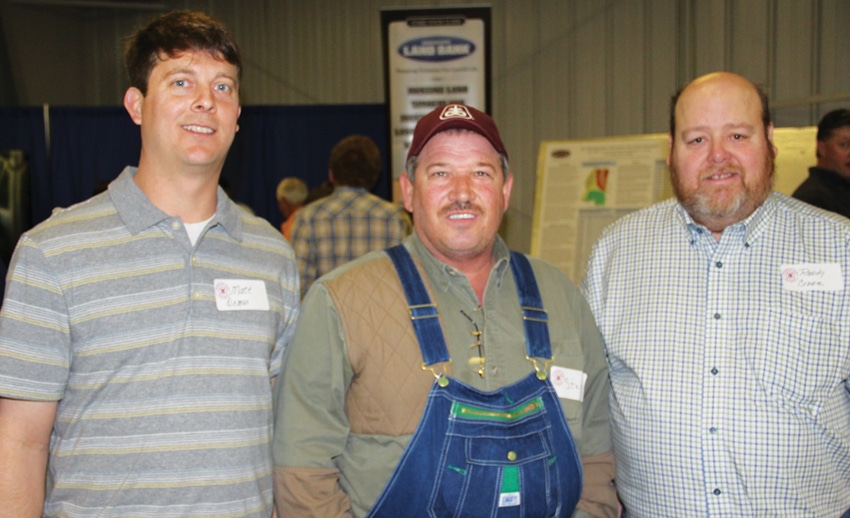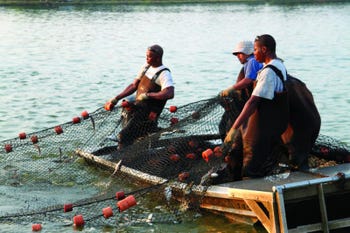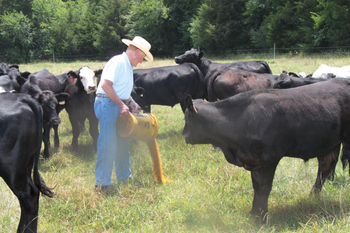
Mississippi agritourism asks 'go-to' assistance
“We believe Mississippi State University can provide resources to educate the agricultural community about agritourism and to help educate the general public about agriculture through agritourism," Jo Lynn Mitchell said at the annual meeting of the Producer Advisory Council for north Mississippi. "If we had a full-time person to work on this, they could provide us with materials and assistance, as is being done with other Extension programs,” she said.

Mississippi needs a “full-time go-to person” to assist the state’s farmers with agritourism, says Jo Lynn Mitchell, whose family has a 1,500-acre row crop farm plus an agritourism operation that attracts thousands of paying visitors each year.
“As things stand, there are five or six different organizations that have a little piece of agritourism as their responsibility,” she said at the annual Producer Advisory Council meeting that allows producers from north Mississippi to discuss programs, projects, and staffing to Mississippi State University Extension and research personnel.
“We need one person we can go to, and we believe MSU can help us with that,” Mitchell said. “We think agritourism offers viable enterprises for established and new farmers. It breathes life into rural communities and acts as a resource to improve agriculture’s image in a broader culture.
AG NEWS delivered daily to your inbox: Subscribe to Delta Farm Press Daily
“We believe MSU can provide resources to educate the agricultural community about agritourism and to help educate the general public about agriculture through agritourism. If we had a full-time person to work on this, they could provide us with materials and assistance, as is being done with other Extension programs.”
Other agriculture sectors presenting their wish lists to MSU officials included:
Aquaculture: “We catfish producers would like additional research on alternative feeds and water quality impact,” said Jay Schmidt. “The impact of antibiotics on immunity is an issue for which we’d like more studies to be sure we aren’t running into problems with these drugs.”
He said research at Stoneville and on the MSU campus is beneficial to the aquaculture industry. “They’re also helping us with competitive issues, studies on ponds, newly-emerging technology, and new ways to raise fish.”
Schmidt says the hiring of an Extension aquaculture agent, Mark Patterson, will be beneficial to the state’s aquaculture industry.
Beef: The Mississippi beef industry is “enjoying good times now,” said cattleman Jake Megehee. “We’ve got high beef prices, corn prices are coming down, cattle numbers are shrinking, and we’re doing a good job of developing markets overseas for specialty products. From each animal slaughtered now, we get $300 worth of variety meats to export.”
There continues to be a need for research to develop “a good cool season perennial grass for northeast Mississippi that will do well in our hot, dry summers on clay soils,” he says. “We also need more research on substitutes for ammonium nitrate, and on an economical control method for fire ants — perhaps on a communitywide basis, since these pests are a problem not only for cattle producers, but for homeowners.”
Megehee said the state’s producers need budgets specific to more costly overwintering in north Mississippi for different livestock enterprises, such as cow/calf operations, stocker operations, and steer operations.
“We need more research on cattle buyer preferences, as to what they specifically look for in cows and what they see as premium characteristics and discount characteristics.”
And he said more education is needed to influence the public’s perception of animal medicine “so we don’t keep losing the drugs we need to produce healthy livestock.”
Megehee noted that at the recent Dixie National Livestock Show and Rodeo at Jackson, the Mississippi Cattlemans Association raised $81,500 for scholarships to “help develop an interest in agriculture among our state’s young people.”
Another $55,500 was raised through a percentage of sales of champion beef cattle, sheep, hogs, and goats, he says. “Altogether, we raised $137,000 for this outstanding scholarship program.”
Dairying making a comeback
Dairy: “While some may say that dairying is on the way out in Mississippi, we believe, to the contrary, that dairying is on the way back,” said Bradley Taylor.
“The Southeast is one of the fastest-growing areas of the U.S., and we believe the 90 to 100 dairies in our state will continue to play an important role, and that the numbers will increase. Milk can’t be transported great distances economically, and our dairies help fill a vital consumer need.
“We need to make sure we’re doing everything we can to keep this industry strong and viable. The Mississippi State University dairy herd — one of the greatest that’s ever been, both Holstein and Jersey — is in a great position to be the research leader in the Southeast and to attract more dairies.
“We would like to see this herd increased to a size adequate to supply all the milk needed for MSU’s famous and profitable cheese-making operation,” Taylor says. “And if is a deficit of milk from the MSU herd, due to seasonality or other issues, we want to be sure the supplemental milk is Mississippi milk.
“We want to continue programs on dairy sustainability, and we want to be sure that if a new group expresses an interest in starting a dairying operation in our state that we put our best foot forward and do everything we can to help them locate here.”
Taylor said the “very important position” of Extension dairy specialist needs to be replaced quickly when the current specialist leaves.”
Equine: Rebecca Stevens: “We need to find ways to generate legislative support for horse slaughter and transporting horses to slaughter,” said Rebecca Stevens, along with programs to educate the public on the positive economic impact of horse slaughter.
“We would like assistance in supporting education programs on humane treatment, correct feeding practices, and making people aware that they shouldn’t have horses if they can’t feed them and properly care for them.
“We also want to help support educational seminars and clinics in conjunction with the new Mississippi equine specialist who is to be hired,” Stevens said. “We’re looking forward to having this new specialist in place to help with these issues.
Goats/sheep: “There is a great need for more research-based information on de-wormers that are effective in Mississippi, and more research on the different kinds of vaccines for Mississippi herds,” said John Kilpatrick.
“We need more accessible technological information so we can quickly get the information we need in emergency situations. There is also a real need for a regularly available small ruminant specialist, someone to whom we can go for the information we need. And we need more, easy to obtain information to help us in making better marketing decisions.”
Swine: “We thank the MSU Animal and Dairy Science for initiating a swine research program,” said Bob Power. “We’d like to see continued development of a method of rapid mass communication from the state level to local producers related to health concerns in all livestock species.
“We would like assistance in compliance with environmental regulations. EPA and the Department of Environmental Quality are driving an awful lot of the regulations that have an impact on our operations, and we need to know more about how to deal with them.”
About the Author(s)
You May Also Like



